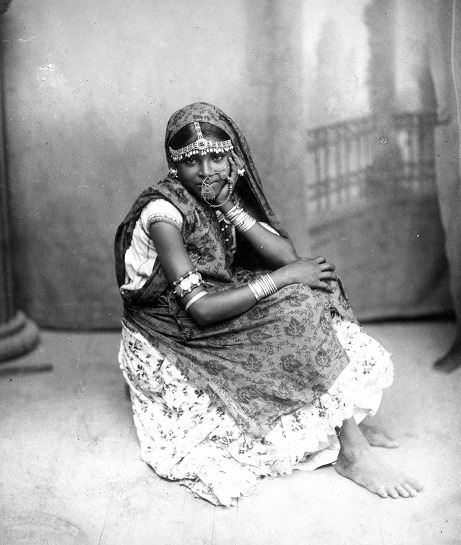
longlisted for the Orwell Prize, which recognizes outstanding political writing,
Many coolie women were either runaways, widows, or outcasts — shunned by society and occasionally in danger of losing their own lives. Many of them left husbands and families behind to migrate alone in epic sea voyages — traumatic “middle passages” — only to face a life of hard labor, dismal living conditions and sexual exploitation. The following excerpt shared by permission of the University of Chicago Press comes from Coolie Woman‘s fourth chapter “Into Dark Waters” and tells the story of a woman named Maharani.
* * *
Maharani could not remember her parents’ names by the time she told her story, in a voice frail with age. She was a child when they died. It was her uncle who provided a lap for her to sit on during her wedding to a much older man, whose name she couldn’t remember either. Providing a lap to a bride, during the era of child marriages in India, seems to have been comparable to walking one down the aisle. Maharani was five when she got married. And she was still just a child, only twelve, when widowed. Soon after, her brother-in-law took her to a magistrate’s office where, too young to know better, she ceded the rights to her inheritance from her husband. For eight years after his death, she cooked and cleaned for her in-laws, bearing their beatings for minor mishaps much like the one that ultimately triggered her journey to Trinidad.

She left, literally, over spilled milk. Maharani had just boiled milk for her in-laws, when a cat crept up to lick the pot. She pelted the cat, the cat fell over and the pot capsized. Anticipating another thrashing, and suddenly unwilling to accept one, she slipped out while her in-laws were eating. In 1987, Maharani explained why she fled:
I say dem go beat me.
Because I getting too much licks.
I say dem go beat me.
Well, I run.
I no tell nobody I leaving.
On the road, later that night, she met a man with one foot at a well. When he heard her predicament, he offered to help: Did she want a job on an island where she could make 25 cents a day? All she would have to do, he claimed, is sift sugar. Did she want to go? Maharani said yes. She did want to go. She would go. “Me nah had nothing,” she said, recalling how, at twenty, she calculated the costs and benefits of leaving India. “I come way. Me nah have nothing.”
As her boat, The Chenab, was anchored in the Hooghly, another ship pulled in, bringing home Indians who had finished their indentures. They clamored to portholes to warn the emigrants staring back out of their own portholes. From a distance, the repatriates shook their hands, gesturing for the emigrants not to go. But it was too late for anyone to heed that message.
This was the point when the umbilical cord connecting the emigrants to India was, presumably, cut. Several survivors of indenture, in the rare accounts that describe the severing, mention weeping; they conjure a scene of breast-beating and wailing as the ship embarked. This was also the point when, according to some versions, the emigrants decisively lost their freedom. The ex-indentured laborer who was Gandhi’s acolyte described a solemn moment: “At that time, many emotions were born in our hearts,” he wrote. “In just the way a free bird is imprisoned in a cage, we were all locked in.” For generations, the descendants of indentured laborers in Guiana, accompanied by the plaintive notes of harmonium and sarangi, sang of a parting that was woeful:
Listen, oh Indian, listen to the story of us emigres,
The emigres who cry constantly, tears flowing from their eyes.
When we left the ports of Calcutta and Bombay,
Brother left sister, mother left daughter.
In deep love of the mother country we cried;
Water flowed from our eyes . . .
Painful is our story, choking is our voice.
But Maharani did not cry. Nor did she remember sounds of sorrow. She remembered drumbeats. Looking back across the span of seven decades, she described how her jahajis played drums provided by the crew and how they sang and danced during the journey:
dem bringing happy
dem en bringing no trouble
dem bringing happy
nobody to study nothing
that’s why dem bringing happy
There was nobody to make her “study” a single thing. Nobody to cause her grief or worry. No brother-in-law to cheat her. No mother-in-law to beat her. Nobody, she thought, to make her tremble in fear any longer. But should Maharani have been so convinced that no one would cause her grief anymore? The warning by the repatriates, as her ship got ready to leave the Hooghly, was ominous. Might they have been warning about the voyage itself, to begin with? Indenture vessels were, after all, crossing in the wake of slavers, with their well-documented horrors, from tragic mortality rates to the rape of women.
* * *
Gaiutra Bahadur is an American journalist and book critic who writes frequently about the culture and politics of global migration. Her reporting, criticism and essays have appeared in The New York Times Book Review, Washington Post Book World, The Nation, The Virginia Quarterly Review, The (London) Observer and Ms., among other publications. Gaiutra studied literature at Yale and journalism at Columbia and was a Nieman Fellow at Harvard. She was born in Guyana and emigrated to the United States with her family when she was six.












